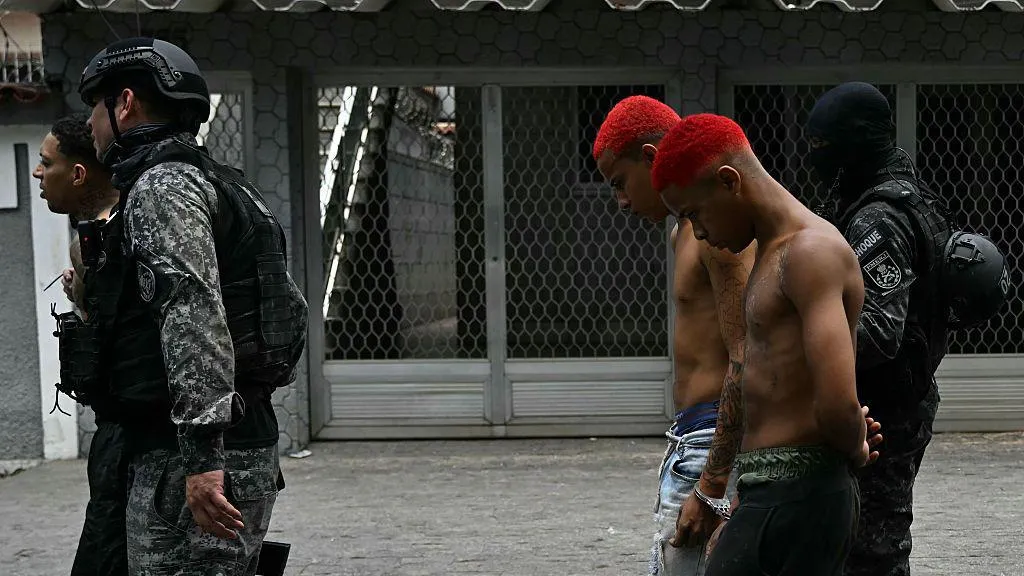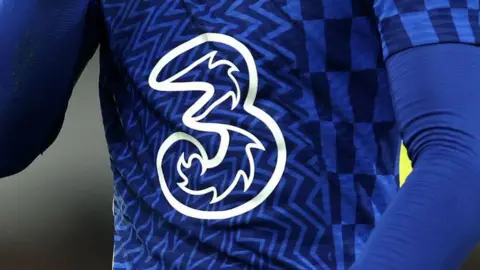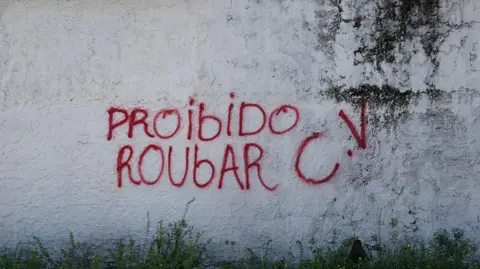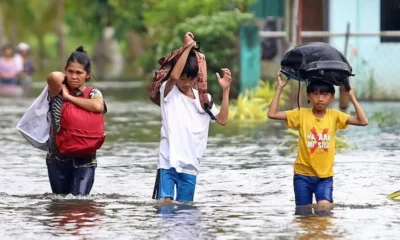Crime
Philippines ex-leader Duterte on plane to The Hague after arrest

A plane carrying the former president of the Philippines, Rodrigo Duterte, has left Manila after the International Criminal Court (ICC) issued a warrant accusing him of crimes against humanity over his deadly “war on drugs”.
He was taken into police custody shortly after his arrival at the capital’s international airport from Hong Kong on Tuesday morning.
Duterte, 79, contested his detention but within hours was on a chartered jet en route to The Hague in the Netherlands, where the ICC sits. Current President Ferdinand Marcos Jr said the country was meeting its legal obligations.
During Duterte’s time in office, thousands of small-time drug dealers, users and others were killed without trial.
Marcos said his predecessor would face charges relating to what he described as Duterte’s “bloody war on drugs”.
“Interpol asked for help and we obliged,” President Marcos told a press conference. “This is what the international community expects of us.”
Duterte’s daughter Sara, who said she would accompany him to The Hague, is vice president and a political rival of Marcos. She has said the arrest amounts to persecution.
Rodrigo Duterte has offered no apologies for his brutal anti-drugs crackdown, which saw more than 6,000 suspects killed when he was president from 2016 to 2022, and mayor of Davao city before that.
Nevertheless,he questioned the basis for the warrant, asking: “What crime [have] I committed?” in a video posted online on Tuesday by another daughter, Veronica Duterte.
“If I committed a sin, prosecute me in Philippine courts, with Filipino judges, and I will allow myself to be jailed in my own nation,” he said in a later video.
In response to his arrest, a petition was launched on his behalf in the Supreme Court – urging it not to comply with the request.
According to a statement from the court’s spokesperson, the former president also called for a declaration that the Philippines withdrawal from the ICC in 2019 “effectively terminated” its jurisdiction over the country and its people.
The ICC says it still has authority in the Philippines over alleged crimes committed before the country withdrew as a member.
Some of Duterte’s supporters rallied at the airport compound, where the former president was taken following his arrest.
“I’m sad because I didn’t think it would come to a point where he would be arrested. For me, he did a lot for our country and this is what they did to him,” one supporter, Aikko Valdon, told the Reuters news agency.
State media said more than 370 police had been deployed to the airport and to other “key locations” to ensure peace was maintained.
While his supporters have criticised the arrest, activists have called it a “historic moment” for those who perished in his anti-drug war and their families, the International Coalition for Human Rights in the Philippines (ICHRP) said.
“Duterte’s arrest is the beginning of accountability for the mass killings that defined his brutal rule,” said ICHRP chairman Peter Murphy.
The former leader had been in Hong Kong to campaign among the large Filipino diaspora there for the 12 May mid-term elections, in which he had planned to run again for mayor of Davao.
Duterte’s arrest marks the “beginning of a new chapter in Philippine history”, said political scientist Richard Heydarian. “This is about rule of law and human rights.”
Heydarian added that authorities had arrested Duterte promptly instead of letting the matter take its course through the local courts to “avoid political chaos”.
The Duterte and Marcos families formed a formidable alliance in the last elections in 2022, where against the elder Duterte’s wishes, his daughter Sara ran as Marcos Jr’s vice-president instead of seeking her father’s post.
The relationship unravelled publicly in recent months as the two families pursued separate political agendas.
Marcos initially refused to co-operate with the ICC investigation, but as his relationship with the Duterte family deteriorated, he changed his stance.
The demand for justice in Duterte’s drug war goes “hand in hand” with the political interests of President Marcos, Mr Heydarian said.
The ‘war on drugs’
Duterte served as mayor of Davao, a sprawling southern metropolis, for 22 years and has made it one of the country’s safest from street crimes.
He cast himself as a tough-talking anti-establishment politician to win the 2016 elections by a landslide.
With fiery rhetoric, he rallied security forces to shoot drug suspects dead. More than 6,000 suspects were killed by police or unknown assailants during the campaign, but rights groups say the number could be higher.
A previous UN report found that most victims were young, poor urban males and that police, who do not need search or arrest warrants to conduct house raids, systematically forced suspects to make self-incriminating statements or risk facing lethal force.
Critics said the campaign targeted street-level pushers and failed to catch big-time drug lords. Many families also claimed that the victims – their sons, brothers or husbands – were simply in the wrong place at the wrong time.
Investigations in parliament pointed to a shadowy “death squad” of bounty hunters targeting drug suspects. Duterte has denied the allegations of abuse.
“Do not question my policies because I offer no apologies, no excuses. I did what I had to do, and whether or not you believe it… I did it for my country,” Duterte told a parliament investigation in October.
“I hate drugs, make no mistake about it.”
The ICC first took note of the alleged abuses in 2016 and started its investigation in 2021. It covered cases from November 2011, when Duterte was mayor of Davao, to March 2019, before the Philippines withdrew from the ICC.
Since taking power, Marcos has scaled back Duterte’s anti-narcotics campaign and promised a less violent approach to the drug problem, but hundreds of drug-related killings have been recorded during his administration.
Duterte remains widely popular in the Philippines as he is the country’s first leader from Mindanao, a region south of Manila, where many feel marginalised by the leaders in the capital.
He often speaks in Cebuano, the regional language, not Tagalog, which is more widely-spoken in Manila and northern regions.
When he stepped down in 2022, nearly nine in 10 Filipinos said they were satisfied with his performance as president – a score unseen among his predecessors since the restoration of democracy in 1986, according to the Social Weather Stations research institute.
His populist rhetoric and blunt statements earned him the moniker “Donald Trump of the East”. He has called Russian President Vladimir Putin his “idol” and under his administration, the Philippines’ pivoted foreign policy to China away from the US, its long-standing ally.
Marcos restored Manila’s ties with Washington and criticised the Duterte government for being “Chinese lackeys” as the Philippines is locked in sea dispute with China.
China’s foreign ministry said on Tuesday that it was “closely monitoring the development of the situation” and warned the ICC against “politicisation” and “double standards” in the arrest of Duterte.
His political heir, Sara, is tipped as a potential presidential candidate in 2028. The incumbent, Marcos, is barred by the constitution from seeking re-election.
Additional reporting by Virma Simonette in Manila and Kelly Ng in Singapore
Taken From BBC News
Crime
Starmer tells Abramovich to ‘pay up now’ or face court

The prime minister has said Russian oligarch Roman Abramovich must “pay up now” to victims of the war in Ukraine or face court action.
Mr Abramovich, the former owner of Chelsea Football Club, pledged in 2022 that the £2.5bn he made from the sale of the club would be used to benefit victims of the Russian invasion of Ukraine.
But there has been a delay in releasing the funds, which are currently frozen in a British bank account, due to a standoff over how exactly they should be used.
Sir Keir Starmer told the Commons on Wednesday: “My message to Abramovich is clear: the clock is ticking.”
The government wants the money to be used for humanitarian aid, but Mr Abramovich insisted it should be used for “all victims of the war” – meaning that Russians could also benefit.
The oligarch cannot access the money under UK sanctions but the proceeds from the Chelsea sale still legally belong to him.
Updating MPs, Sir Keir said the UK had issued a licence “to transfer £2.5bn from the sale of Chelsea Football Club that’s been frozen since 2022.”
And, in a warning to Abramovich, he said: “Honour the commitment that you made and pay up now, and if you don’t we’re prepared to go to court and ensure that every penny reaches those whose lives have been torn apart by Putin’s illegal war.”
And Foreign Secretary Yvette Cooper told the BBC Mr Abramovich “needs to honour that commitment, pay that money”.
Asked if a legal battle could drag out the process for years, Ms Cooper said: “I’m urging him not to try and pursue further court action.”
But she confirmed the government will take the matter to court if he does not act.
Mr Abramovich’s representatives declined to comment.
The Treasury said that under the terms of the licence, the money must go to “humanitarian causes” in Ukraine and cannot benefit Mr Abramovich or any other sanctioned individual.
The government first threatened to sue Mr Abramovich in June.
Chancellor Rachel Reeves said: “It is unacceptable that more than £2.5bn of money owed to the Ukrainian people can be allowed to remain frozen in a UK bank account.”
Mr Abramovich – a Russian billionaire who made his fortune in oil and gas – was granted a special licence to sell Chelsea following Russia’s invasion of Ukraine, providing he could prove he would not benefit from the sale.
He is alleged to have strong ties to Russian President Vladimir Putin, something he has denied.
It is understood that Mr Abramovich has 90 days to act before the UK considers taking legal action.
On Thursday, EU leaders are set to review proposals to use proceeds from frozen Russian assets to support Ukraine’s huge budget and defence needs. Russia has fiercely opposed the proposals.
Crime
Deadly Rio police raid failed to loosen gang’s iron grip, residents say

New details which have emerged in the aftermath of Brazil’s deadliest police operation are casting doubts over whether the raid really struck at the heart of one of the country’s most powerful criminal gangs, as was its stated aim.
One hundred and twenty one people, among them four police officers, were killed in the raid on 28 October in Rio de Janeiro.
The governor of Rio de Janeiro state, Claudio Castro, described the police operation as “a success”, posting a photo showing the more than 100 rifles seized by police.
But rights groups have sharply criticised the security forces pointing to the high death toll and what they have described as the “brutality” of their actions.
The operation was the largest ever carried out by Rio’s security forces and saw 2,500 officers deployed to the Alemão and Penha neighbourhoods.
It targeted the Comando Vermelho (Red Command) criminal gang, which rules over the nine-million-square-metre area.
Rio’s public safety secretary, Victor dos Santos, told Reuters that the goal of the operation had been to carry out scores of arrest warrants issued by prosecutors.
But when BBC Brasil cross-checked the list of the deceased published by police against the 68 names on the list of suspects provided by prosecutors, it found that none of them matched.
Local media have also pointed out that even though scores of suspects were arrested during the raid, the man considered the gang’s most powerful leader, Edgar Alves de Andrade, also known as Doca, was not among them.
“Early reports stated that the goal of the operation was to capture high-ranking leaders of the Comando Vermelho (CV),” Carlos Schmidt-Padilla, professor of public policy at the University of California, Berkeley, told BBC Brasil.
“By that metric, it is fair to say the operation failed.”
At a Senate hearing, the deputy intelligence secretary for Rio’s military police stated that the raid had had a “negligible” impact on dismantling Comando Vermelho.
Residents of the Alemão and Penha have also told the BBC that it has done little to loosen the tight grip the CV has on their favelas.
How Rio’s gangs rule through fear and control
They said that their daily lives had barely changed since the mega-operation, describing seeing armed men roaming the community the very next day, even as the bodies of those killed were still being removed.
Comando Vermelho (CV) and groups like it enforce strict rules in the areas they control.
These criminal enterprises have moved beyond the sale of drugs and now hold the monopoly for the provision of gas, cable television, internet and transport.
Residents report being charged over the odds for gas cylinders, often having to pay one third more than in zones not under gang control.
Rules imposed by gang members affect everyday life.
As CV has banned cars working for ride-hailing apps from entering the favelas, locals are restricted to using motorbike taxis and vans which have been authorised by the gangs to operate there.
Even people’s clothing is policed by the gang. In 2020, residents of Penha were told not to wear Chelsea football shirts.
At the time, the jerseys were sponsored by British telecoms company Three, but CV members did not like the number being prominently displayed because it reminded them of a rival gang which happened to have the number three in its name: Terceiro Comando Puro (Pure Third Command).

Punishments for what are considered transgressions are extremely harsh. Being caught stealing can mean losing a hand or being burned alive.
Gang members “sit in judgement” over domestic violence cases and those found guilty are beaten or even executed.
Residents are forbidden from engaging in relationships with members of rival factions or with police officers.
They also know not to photograph or film drug dens or any of the armed men driving through their community.
But with mobile phone use ubiquitous, even gangs as powerful as Comando Vermelho struggle to control what gets posted online.
In Rocinha, a favela under CV control, gang members vowed to kill those who leaked a 2020 video showing a CV leader surrounded by rifles and machine guns.
When someone insists on “causing trouble”, the group often resorts to assault and torture.

Police investigation files on Comando Vermelho, seen by the BBC, contain disturbing images.
One shows a woman forcibly submerged in an ice bath, accompanied by a caption accusing her of being “aggressive” and “causing trouble”.
Reports of growing violence and expanding territorial control by Comando Vermelho formed the basis of the complaint filed by Rio’s Public Prosecutor’s Office which led to the massive police operation on 28 October.
And while rights groups labelled it a “massacre” and questioned its effectiveness, Rio de Janeiro State Governor Claudio Castro has announced that more operations against organised crime will follow.
A poll conducted by AtlasIntel suggests that Castro’s approval rating has risen since the raid, and at 47% now stands higher than that of the president, Luiz Inácio Lula da Silva.
President Lula, for his part, has announced that the federal government would launch an investigation into the raid.
But in a post on Instagram published on 11 November, Governor Castro said he would “not back down”.
“Law-abiding citizens can’t take it anymore. Rio has fought back – and the whole of Brazil is fighting back with us.”
Crime
Mystery ‘fedora man’ at Louvre heist scene revealed as teenage detective fan

In the three weeks since the Louvre museum heist, as investigators sought to find out who was behind it and why the French crown jewels had been so easy to steal, another mystery remained: who the “fedora man” was.
The dapper youth in a hat was photographed outside the museum that Sunday and went viral on social media, prompting theories about his identity.
The first two mysteries were swiftly settled. The thieves’ carelessness with DNA allowed police to work out their identities. The Louvre director admitted CCTV security was inadequate.
However, the fedora man remained an enigma – until now.
The dandy, it turns out, is a local teenage fan of Sherlock Holmes and Hercule Poirot who just happened to be at a real crime scene.
Pedro Elias Garzon Delvaux, a 15-year-old from Rambouillet, south-west of Paris told the Associated Press (AP) news agency that he had planned to visit the Louvre with his family but found the museum was closed.
“We didn’t know there was a heist,” he said.
As he asked officers about the closure, an AP photographer seeking to capture the security cordon took a picture and included Pedro in the frame.
Pedro only realised the photo had gone viral four days later, when a friend sent him a screenshot asking: “Is that you?”
When he replied that it was, the friend said he had five million views on TikTok. “I was a bit surprised,” Pedro told the AP.
He was even more shocked when his mother called to say the picture had appeared in The New York Times. It made a big impact on him, he said, because he reads that newspaper and “it’s not every day you’re in the New York Times”.
“People said, ‘You’ve become a star’. I was astonished that just with one photo you can become viral in a few days.”
Asked why he wore an old-fashioned waistcoat and a fedora to the museum, Pedro said he began dressing this way recently, inspired by 20th-century statesmen and fictional detectives.
“I like to be chic,” he told the AP. “I go to school like this.”
As wild speculation about the photo of him circulated online – some wondered whether he might be a real detective or an AI fake – Pedro remained silent for weeks.
“I didn’t want to say immediately it was me,” he said. “With this photo there is a mystery, so you have to make it last.”
-

 Europe News12 months ago
Europe News12 months agoChaos and unproven theories surround Tates’ release from Romania
-

 American News12 months ago
American News12 months agoTrump Expels Zelensky from the White House
-

 American News12 months ago
American News12 months agoTrump expands exemptions from Canada and Mexico tariffs
-

 American News12 months ago
American News12 months agoZelensky bruised but upbeat after diplomatic whirlwind
-

 Art & Culture12 months ago
Art & Culture12 months agoThe Indian film showing the bride’s ‘humiliation’ in arranged marriage
-

 Pakistan News8 months ago
Pakistan News8 months agoComprehensive Analysis Report-The Faranian National Conference on Maritime Affairs-By Kashif Firaz Ahmed
-

 Art & Culture12 months ago
Art & Culture12 months agoInternational Agriculture Exhibition held in Paris
-

 Politics12 months ago
Politics12 months agoUS cuts send South Africa’s HIV treatment ‘off a cliff’











